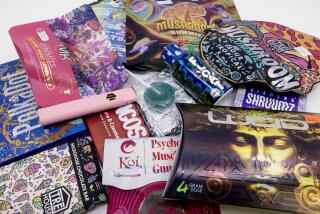FDA Bans Chinese Mushrooms After Food Poisonings : Health: U.S. officials say they believe contamination “may be widespread” in the Asian
- Share via
WASHINGTON — The Food and Drug Administration announced Monday that it will indefinitely ban all shipments of canned mushrooms from China following what the FDA called “a significant and alarming” series of outbreaks of severe food poisoning.
FDA officials said they believed that contamination with staphylococcal enterotoxin “may be widespread” throughout the mushroom processing industry in China, and the ban will continue “until satisfactory sanitation control measures” are implemented in China.
In 1987--the latest figures available--the United States imported 158 million pounds of mushrooms in containers, 41% of which came from China, according to the Assn. of Food Industries, a major importer of processed foods.
“If prices were the same as they were in 1987, they’ve lost $41.5 million in trade,” said Richard Sullivan, a spokesman for the importers’ association. “That’s a pretty significant loss in trade dollars for China.”
Sullivan estimated that Chinese mushrooms accounted for about 25% of the canned mushrooms consumed in the United States last year. A statement from the Chinese Embassy in Washington said that the problem was confined to a few cases, and that effective corrective measures have already been taken. “This will not benefit China-U.S. trade,” the statement said.
The FDA action represents a major expansion of a ban that began last May with institutional-size cans following four outbreaks of illness in which about 100 people became sick. No one died, but 16 people were hospitalized.
Since then, the FDA said, inspectors have identified contamination in additional smaller sizes of cans produced by 10 plants in China. Also, the agency said, the FDA has reason to believe that two processing plants in China that have not been approved by the United States may have used the codes of other, approved plants to try to export their products illegally.
“The results of our investigation give us no reason to have confidence in the safety of any style or any size can of mushrooms processed in the PRC (People’s Republic of China),” said Ronald G. Chessmore, the FDA’s acting associate commissioner for regulatory affairs, in a letter to Chinese officials here.
Thus far, all of the illnesses have been linked to mushrooms shipped in 68-ounce or No. 10 institutional-size cans. “This is not the size a consumer would be expected to buy,” said Chris Lecos, a spokesman for the FDA. Last spring, Lecos said, the agency notified all state health and other regulatory officials responsible for retail food markets, as well as all major trade associations responsible for the distribution of these products, alerting them to potential contamination.
Since then, however, the FDA has found toxin in size 5.5 and 16-ounce cans, which consumers can purchase in retail outlets.
“We cannot rule out the possibility that smaller size cans may have ended up on the retail food shelf and in someone’s home,” Lecos said.
However, he said, “any product produced by the PRC, from any one of the processing plants, would be so identified. It would be very clear that this product came from the PRC. It has to be labeled. That’s one of the requirements.”
Lecos said that products shipped from now on either will remain at the port of entry or returned to China. Brined mushrooms, which are customarily shipped in bulk to U.S. plants for canning under a U.S. company’s label, will have to be tested privately by importers before the FDA will allow their release, the agency said.
Lecos said that “the burden is on the Chinese” to prove their processing plants are safe and sanitary and the FDA will not allow mushrooms into the United States until it is satisfied that this has been accomplished.
The FDA said that 62 mushroom processing plants in China are currently registered with the FDA, as required of both domestic and foreign manufacturers of low-acid canned foods.
“In all our previous dealings with representatives of the Chinese government we have not been satisfied with the information we have received,” Lecos said. He said the agency has offered to send an FDA team to China but “it is up to the Chinese” to allow them to come.
He added: “This is a very serious problem that is widespread. Obviously China has a lot of work to do.”
Symptoms of food poisoning involving staphylococcal toxins can develop rapidly after eating a contaminated product, and include nausea, vomiting, retching, abdominal cramping and prostration. In more severe cases, headaches, muscle cramping and changes in blood pressure and pulse rate can also occur, the FDA said. In most cases, those stricken recover in two or three days.
More to Read
Sign up for Essential California
The most important California stories and recommendations in your inbox every morning.
You may occasionally receive promotional content from the Los Angeles Times.










